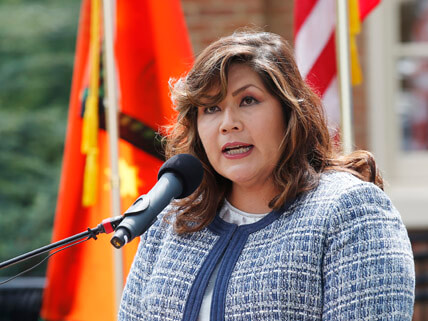Cherokee Nation congressional delegate Kimberly Teehee speaks at a press conference on August 22, 2019.
A long-standing treaty provision that created a nonvoting Cherokee Nation position in Congress had gone unfulfilled—until now. In September 2019, the Cherokee Nation approved Kimberly Teehee as its first delegate to the U.S. House of Representatives. Teehee’s congressional seat was guaranteed in the December 1835 Treaty of New Echota between the United States and the Cherokee Nation.
It was the same treaty that led to the devastating Trail of Tears, in which an estimated 5,000 Cherokee died during a 1,200-mile journey to Native American territory west of the Mississippi River. “Literally blood, sweat, and tears,” Teehee characterized the trek. Today the Cherokee Nation, based in northeastern Oklahoma, has about 400,000 members, making it the largest of the nearly 600 federally recognized Native American tribes.
Teehee grew up in Oklahoma. As a college student, she interned for Wilma Mankiller, the Cherokee Nation’s first female chief. “I got to travel with her, got to research for her,” Teehee recalls. Mankiller advised her to get a law degree. Teehee did more than that, becoming a longtime advocate for indigenous people. Teehee has served as vice president of government relations for the Cherokee Nation, and from 2009 to 2012 she was President Barack Obama’s senior policy adviser for Native American affairs.
She plans to bring the same concern for Native Americans’ interests to her new role in Congress. Though she can’t vote on the House floor, she can introduce legislation, participate in debates on the floor, and vote within whichever committees she is assigned to. Teehee joins four other Native Americans elected to Congress: Democrats Sharice Davids (Ho-Chunk) of Kansas and Deb Haaland (Pueblo of Laguna) of New Mexico and Republicans Markwayne Mullin (Cherokee) and Tom Cole (Chickasaw), both of Oklahoma.
Although the Treaty of New Echota was strongly protested at the time, Teehee and fellow Cherokee today respect the treaty’s guarantee of congressional representation. “These treaties are sacred,” Cherokee Nation chief Chuck Hoskin Jr. said of the 1835 agreement. Hoskin nominated Teehee as a congressional delegate. “They mean something. There’s no expiration date on them.”
But after so many years, why now? “I don’t look at it as ‘Why now?’,” Teehee explained, “as much as I look at it as ‘Why not now?’”
©Sue Ogrocki/AP Images
Related Links:
- Cherokee Nation Names First Delegate to Congress
Cherokee Kimberly Teehee goes to Washington.
(Source: NPR, September 3, 2019) - Trail of Tears
The story behind the devastating Trail of Tears.
(Source: History.com; updated February 21, 2020) - 5 Powerful and Influential Native American Women
Discover five powerful and influential Native American women.
(Source: Biography.com; updated March 3, 2020) - Native American History Timeline
Learn about key events that shaped Native American history.
(Source: History.com; updated August 2, 2019) - A Journey of Injustice
This site explores the grim history and geography of the Trail of Tears; includes photo galleries of the National Historic Trail that runs from Georgia to Oklahoma.
(Source: National Park Service; accessed March 17, 2020)




